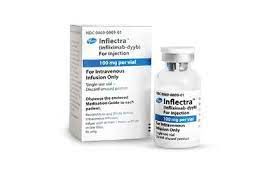- Bone Health
- Immunology
- Hematology
- Respiratory
- Dermatology
- Diabetes
- Gastroenterology
- Neurology
- Oncology
- Ophthalmology
- Rare Disease
- Rheumatology
Dose Adjustment, Infusion Interval Changes Hold Value for Patients With AS Treated With CT-P13
Investigators said the RAAS study filled in missing information on the value of dose modulations and infusion interval changes for patients with ankylosing spondylitis (AS) treated with CT-P13 (Remsima, Inflectra).
Investigators said dose adjustments and infusion interval changes have demonstrated potential to improve clinical outcomes in the 5-year RAAS (Rheumatoid Arthritis and Ankylosing Spondylitis) study of patients with ankylosing spondylitis (AS) treated with a biosimilar form of infliximab (CT-P13, Inflectra, Remsima).
CT-P13 is approved for use in 98 countries, and the generally approved maintenance regimen is 5 mg/kg infused every 6 to 8 weeks. Whereas variations on standard dosage and infusion intervals can be beneficial for patients, real-world data on such modulations for CT-P13 were lacking.
In this Republic of Korea retrospective study, the effect of changes in dosage and infusion for patients (18 years old) with AS (N = 337) were evaluated. The study included patients naive to infliximab treatment with CT-P13 (n = 219) and those who switched from the reference product (n = 118).
Investigators said 7.7%, 49.1%, and 54.3% of evaluable patients had dose, infusion interval, or combined treatment pattern changes, respectively. Disease activity improvements were greater for patients who underwent treatment pattern changes, although drug survival did not change significantly between patients with and without changes in treatment patterns.
“Findings suggest that adjusting the dose and/or infusion interval can improve clinical outcomes for CT-P13–treated patients with AS,” the authors wrote.
Prior Studies of Infliximab in AS
Prior studies have shown that lower-dose (3 mg/kg) infliximab treatment can be effective in AS; however, the same is not true across the board. Patients with psoriatic arthritis have not experienced significantly improved drug survival or treatment response at doses lower than 5 mg/kg, and patients with rheumatoid arthritis have seen improved clinical response with infliximab dose and infusion interval adjustments.
“In patients with AS, individualized dose/interval adjustments based on treatment response may be warranted to achieve clinical targets in some cases” and “lower-dose infliximab has been demonstrated to be well tolerated in patients with AS and is associated with significantly lower health care system costs,” the authors wrote.
In the RAAS analysis, 45.7% of evaluable patients did not have dose or infusion interval changes, and these were considered the control group. In this study, more CT-P13–naive patients (61.0%) had dose or interval changes than switched patients (42.6%).
Baseline dose groups were as follows: <4 mg/kg (n = 71), ≥ 4 to < 5 mg/kg (n = 117), and ≥ 5 mg/kg (n = 82). Whereas baseline demographics and disease characteristics were similar between these groups, patients in the < 4-mg/kg group had the lowest median Bath Ankylosing Spondylitis Disease Activity Index (BASDAI) scores overall.
“Following initial decreases as naive patients initiated CT-P13, median BASDAI scores remained consistent over time,” the investigators said. “Drug survival did not differ significantly between baseline dose groups overall or for naive patients.”
In the infusion interval analysis, the investigators said although median baseline infusion intervals were slightly lower in the treatment-naive cohort (6-8 weeks) compared with overall and switched patients, mean infusion intervals increased slightly from year 1 to year 3 in all groups and decreased in year 4, most notably in the treatment-naive group.
“Switched patients had longer infusion intervals than naive patients throughout,” the investigators said.
Study Conclusions
The 5-year analysis was successful in elucidating treatment patterns with CT-P13 in patients with AS in routine clinical practice, they concluded.
Changes to infusion intervals were more common than dosage changes, and greater improvements in BASDAI scores were observed in the combined-changes vs combined-constant group, suggesting “that adjusting dose and/or infusion interval can improve clinical outcomes for patients with AS receiving CT-P13 treatment,” the authors said.
“Drug survival was comparable between baseline dose groups, with no adverse impact of lower baseline doses,” they wrote.
Newsletter
Where clinical, regulatory, and economic perspectives converge—sign up for Center for Biosimilars® emails to get expert insights on emerging treatment paradigms, biosimilar policy, and real-world outcomes that shape patient care.

